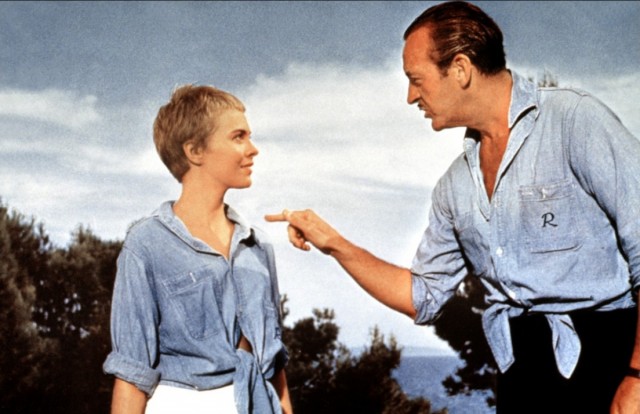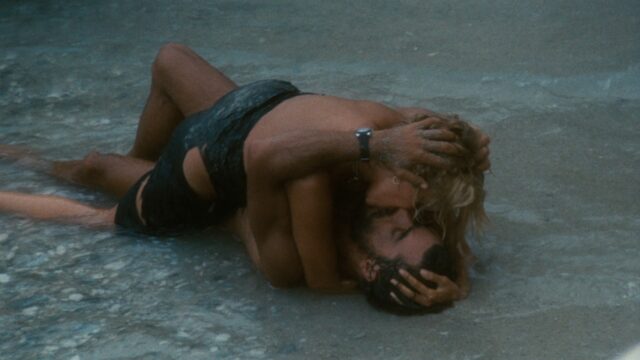
Be prepared to get swept away by summer film festival at Metrograph
SUMMER AT SEA
Metrograph
7 Ludlow St. between Canal & Hester Sts.
July 5 – September 2
212-660-0312
metrograph.com/film
It’s easy to get swept away by Metrograph’s “Summer at Sea,” a two-month festival of nineteen films set at the beach, on the ocean, and poolside. Among the wide-ranging works being shown are Agnès Varda’s La Pointe Courte, Christian Petzold’s Afire, Federico Fellini’s And the Ship Sails On, Chris Sanders and Dean DeBlois’s Lilo & Stitch, Luchino Visconti’s Death in Venice, Jacques Deray’s La Piscine, and Lina Wertmüller’s Swept Away . . . by an Unusual Destiny in the Blue Sea of August. Below is a closer look at several of the movies.
In addition, on July 20, Metrograph will be hosting its annual Summer Book Fair, this year honoring the late dance critic, literary editor, and publisher Robert Gottlieb, who passed away in June 2023 at the age of ninety-two. Gottlieb worked with such authors and celebrities as John Cheever, Doris Lessing, Chaim Potok, Salman Rushdie, John le Carré, Ray Bradbury, Michael Crichton, Toni Morrison, Bill Clinton, Nora Ephron, Katharine Hepburn, Lauren Bacall, Liv Ullmann, Paul Simon, Bob Dylan, and, most famously, Robert Caro; his longtime collaboration with Caro was documented in the terrific 2022 film Turn Every Page: The Adventures of Robert Caro and Robert Gottlieb. The fair will feature more than five hundred film books owned by Gottlieb, which will be availabie for sale, each one stamped with a seal certifying “From the Library of Robert Gottlieb.”
BONJOUR TRISTESSE (Otto Preminger, 1958)
Metrograph
Friday July 5, 4:45
Sunday July 7, 12:20
Sunday July 14, 7:30
metrograph.com/film
Douglas Sirk would surely be proud of Otto Preminger’s wickedly obsessive 1958 melodrama, Bonjour Tristesse. Based on the 1954 novel by eighteen-year-old author Françoise Sagan, the film, whose titles translates as “Hello, Sadness,” stars Jean Seberg as Cécile, a seventeen-year-old girl on the cusp of womanhood, a child-adult living the good life while beginning to enjoy the pleasures of drinking, smoking, and sexual desire. She and her wealthy father, Raymond (a dapper David Niven), have moved into a posh villa on the French Riviera for the summer, where the widowed Raymond attempts to balance his time with serious fashion queen Anne Larsen (Deborah Kerr) and flighty young blonde Elsa (Mylène Demongeot). A selfish cad who considers only himself, Raymond is soon in deep water when the two women find out about each other. Meanwhile, Cécile tosses aside her studies in order to flirt with twenty-five-year-old neighbor Philippe (Geoffrey Horne) and other older men who quickly fall in love with her relatively carefree lifestyle, one that seemingly can only end in trouble.
Written by Arthur Laurents (Anastasia, The Way We Were), beautifully photographed in color (in Saint-Tropez) and black-and-white (in Paris) by Georges Périnal (Rembrandt, The Fallen Idol), and featuring costumes by Givenchy and jewelry by Cartier, Bonjour Tristesse examines love, lust, power, style, and jealousy, directed with an iron fist by Preminger, who often yelled at and embarrassed Seberg on-set in order to influence her performance. But at the heart of the film is the risqué relationship between Raymond and Cécile, one that more than hints at incest.
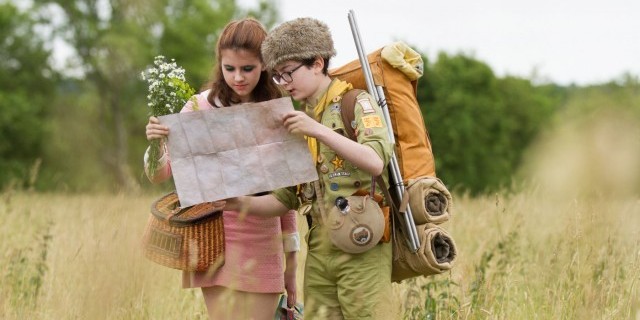
Sam Shakusky (Jared Gilman) and Suzy Bishop (Kara Hayward) are on the run in Wes Anderson’s delightful Moonrise Kingdom
MOONRISE KINGDOM (Wes Anderson, 2012)
Friday July 5, 5:00
Saturday July 6, 2:45
Wednesday July 10, 3:30
metrograph.com/film
In such unique films as Rushmore, The Royal Tenenbaums, and The Darjeeling Limited, black-comedy master Wes Anderson has created a bizarre collection of characters who seem to live in their own alternate realities. In Moonrise Kingdom, Anderson has once again assembled an oddball assortment of men, women, and children in a terrifically clever and entertaining fairy tale all its own. Tired of being abused by his fellow Khaki Scouts and dismissed by his foster parents, twelve-year-old orphan Sam Shakusky (Jared Gilman) runs away from Camp Ivanhoe on the island of New Penzance, much to the chagrin of dedicated scout master Randy Ward (Edward Norton). Meanwhile, twelve-year-old loner Suzy Bishop (Kara Hayward) is fed up with her life as well, which she mostly spends listening to Benjamin Britten, reading fairy tales (fictitious stories made up by Anderson), watching the world through a pair of ever-present binoculars, and despising her parents (Bill Murray and Frances McDormand). Afraid of what might have happened to the children, the local police officer, Captain Sharp (Bruce Willis), gets involved, as does a stern woman from social services (Tilda Swinton) and, eventually, a very different kind of scout, Cousin Ben (Jason Schwartzman).
The proceedings are overseen by a narrator (Bob Balaban) who ends up being more than just an omniscient presence. Moonrise Kingdom is an absolute gem of a film, an exciting, original tale about growing up told in a fabulously funny deadpan manner that combines slapstick humor with wildly ironic elements, filled with the endless wonders of childhood, although it is most definitely not for children. Newcomers Gilman and Hayward appear wise beyond their years in the lead roles, with outstanding support from an all-star cast, most prominently Norton as the by-the-book scout master on a mission. Written by Anderson with Roman Coppola, the film also features a lovely score by Alexandre Desplat.
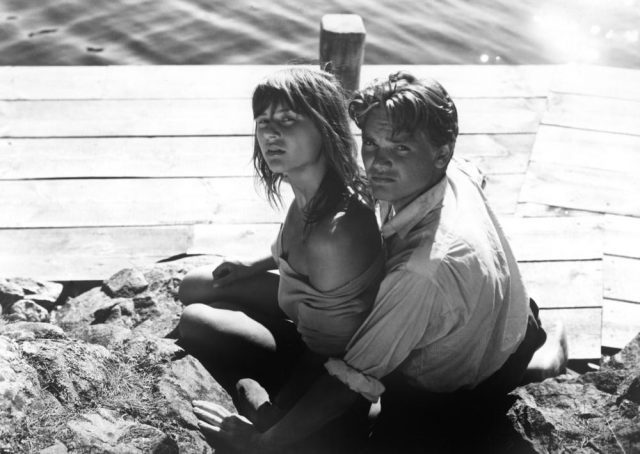
Harry (Lars Ekborg) and Monika (Harriet Andersson) run away to start a new life in Summer with Monika
SUMMER WITH MONIKA (SOMMAREN MED MONIKA) (Ingmar Bergman, 1953)
Metrograph
Friday July 5, 7:10
Saturday July 6, 5:00
Thursday July 11, 4:15
metrograph.com/film
Swedish director Ingmar Bergman shocked the film world in 1953 with the controversial Summer with Monika, the tale of two young lovers who run away from their families and go on a brief but intense sexual adventure. The film featured full-frontal nudity by Harriet Andersson, with whom Bergman had a short relationship; the movie was actually edited down by distributor Kroger Babb to focus on the sex and nudity, renaming it Monika, the Story of a Bad Girl! and marketing it to US audiences as an exploitation picture. But Film Forum is screening the superb original version as part of its five-week centennial celebration of Bergman’s birth. Based on the 1951 novel by Per Anders Fogelström, Summer with Monika takes place in a working-class area of Stockholm, where Harry (Lars Ekborg) and Monika (Harriet Andersson) toil away in a glassware factory. Harry lives with his ailing father (Georg Skarstedt), while Monika sleeps in her family’s kitchen. Both teens are bored with their already dull and unfulfilling lives. So when they meet in a café, the bold, forward Monika lures the shy, fragile Harry into what begins as a summer of fun, as they steal Harry’s father’s boat and head out to their own private hideaway, but ends up as something very different. Bergman boils down an entire relationship — courtship, romance, children, breakup, in a way a precursor to his later epic, Scenes from a Marriage — into ninety-seven sharp, intuitive moments, turning clichéd plot twists into subtle statements on life and family. Cinematographer Gunnar Fischer shoots the film in a dark, gloomy black-and-white, with stark close-ups — Monika stares directly into the camera at one point, challenging the audience — and long shots of water and nature, while Erik Nordgren’s score is kept spare, with Bergman favoring natural sound and light.
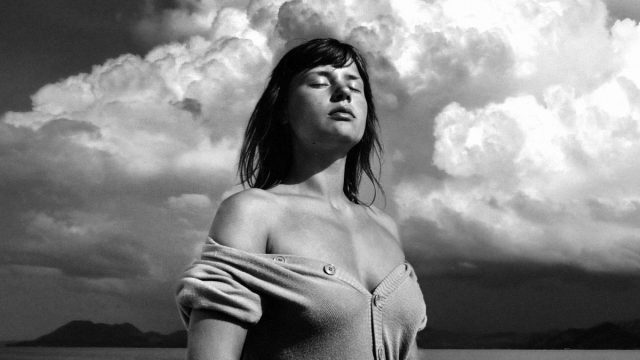
Harriet Andersson stars as a fierce, independent spirit in Ingmar Bergman’s Summer with Monika
Andersson, who would go on to make many more films with Bergman, including Sawdust and Tinsel, Smiles of a Summer Night, Cries and Whispers, and Fanny and Alexander, is enticing as Monika, who doesn’t mind stepping on people’s souls while asserting herself as an independent woman, while Ekborg, who had a small part in Bergman’s The Magician, shows plenty of vulnerability as Harry, who wants to do the right thing and is ready to at least try to be a grown-up when things get complicated. The film is still shocking after all these years, and still rings true. “I want summer to go on just like this,” Monika says. But there are always other seasons, and more summers, to come.
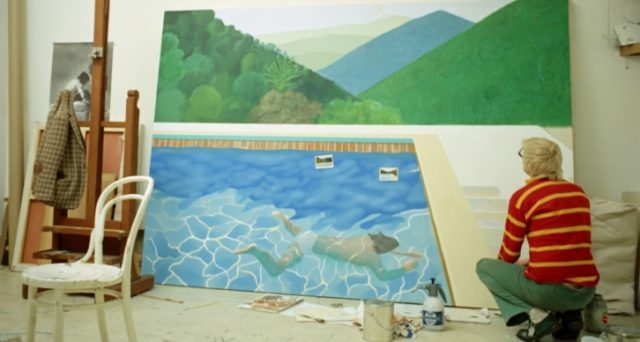
David Hockney works on his masterpiece in Jack Hazan’s A Bigger Splash
A BIGGER SPLASH (Jack Hazan, 1974)
Metrograph
Monday, July 8, 4:00pm
metrograph.com
In June 2019, Metrograph premiered a 4K restoration of Jack Hazan’s pivotal 1974 A Bigger Splash, a fiction-nonfiction hybrid that was a breakthrough work for its depiction of gay culture as well as its inside look at the fashionable and chic Los Angeles art scene of the early 1970s. In November 2018, David Hockney’s Portrait of an Artist (Pool with Two Figures) sold at auction for $90.3 million, the most ever paid for a work by a living artist. A Bigger Splash, named after another of Hockney’s paintings — both are part of a series of canvases set around pools in ritzy Los Angeles — takes place over three years, as the British artist, based in California at the time, hangs out with friends, checks out a fashion show, prepares for a gallery exhibition, and works on Portrait of an Artist (Pool with Two Figures) in the wake of a painful breakup with his boyfriend, model, and muse, Peter Schlesinger, who is a key figure in the painting.
It’s often hard to know which scenes are pure documentary and which are staged for the camera as Hazan and his then-parter, David Mingay, who served as director of photography, tag along with Hockney, who rides around in his small, dirty BMW, meeting up with textile designer Celia Birtwell, fashion designer Ossie Clark, curator Henry Geldzahler, gallerist John Kasmin, artist Patrick Procktor, and others, who are identified only at the beginning, in black-and-white sketches during the opening credits. The film features copious amounts of male nudity, including a long sex scene between two men, a group of beautiful boys diving into a pool in a fantasy sequence, and Hockney disrobing and taking a shower. Hockney’s assistant, Mo McDermott, contributes occasional voice-overs; he also poses as the man standing on the deck in Portrait of an Artist (Pool with Two Figures), only to be replaced by Schlesinger later. There are several surreal moments involving Hockney’s work: He cuts up one painting; Geldzahler gazes long and hard at himself in the double portrait of him and Christopher Scott; and Hockney tries to light the cigarette Procktor is holding in a painting as Procktor watches, cigarette in hand, mimicking his pose on canvas. At one point Hockney is photographing Schlesinger in Kensington Gardens, reminiscent of Michelangelo Antonioni’s Blow-Up, which questions the very nature of capturing reality on film.
Hockney was so upset when he first saw A Bigger Splash, which Hazan made for about twenty thousand dollars, that he offered to buy it back from Hazan in order to destroy it; Hazan refused, and Hockney went into a deep depression. His friends ultimately convinced him that it was a worthwhile movie and he eventually accepted it. It’s a one-of-a-kind film, a wild journey that goes far beyond the creative process as an artist makes his masterpiece. Hockney, who will turn eighty-six on July 9, has been on quite a roll of late. He was the subject of a 2016 documentary by Randall Wright, was widely hailed for his 2018 Met retrospective, saw one of his paintings set an auction record, and had a major show at the Morgan Library in 2020-21, “David Hockney: Drawing from Life.” In addition, Catherine Cusset’s novel, Life of David Hockney, was published in 2019 in English, a fictionalized tale that conceptionally recalls A Bigger Splash.
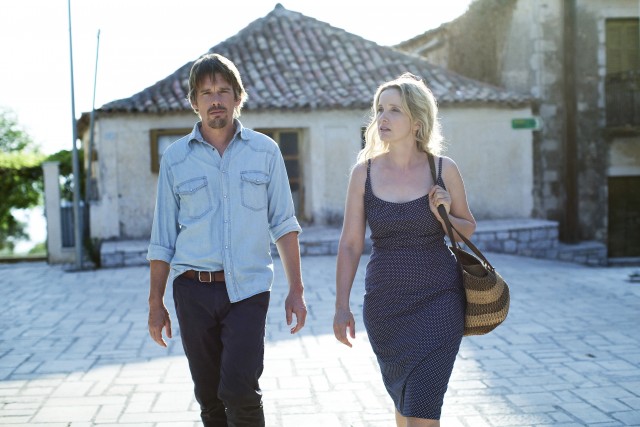
Jesse (Ethan Hawke) and Celine (Julie Delpy) are back together again in Richard Linklater’s Before Midnight
BEFORE MIDNIGHT (Richard Linklater, 2013)
Metrograph
Friday July 12, 4:15
Saturday July 13, noon
metrograph.com/film
Unable to resist revisiting the characters who first fell in love in 1995’s Before Sunrise and again in 2004’s Before Sunset, Ethan Hawke and Julie Delpy reprise their roles as Jesse and Celine, respectively, in Richard Linklater’s absolutely wonderful Before Midnight. The couple first met on a train to Vienna in 1994, talking at length about their hopes and desires and planning on getting together in six months’ time, but they don’t reconnect for another nine years, when Celine comes to one of Jesse’s book signings in Paris. In real time, they walk around the City of Light, catching up on what has happened in their lives as Jesse prepares to take a plane back home to his wife and son. And now another nine years have passed, and Jesse and Celine are living together, the parents of twins (Charlotte and Jennifer Prior). As the film opens, the divorced Jesse is putting his teenage son, Hank (Seamus Davey-Fitzpatrick), on a plane after having spent the summer together in Greece. What follows is a marvelous fourteen-minute scene of Jesse driving down a mountain road as he and Celine essentially let the audience know what has occurred over the last nine years: They have twin girls (sleeping in the back), Celine has been offered an important environmental job, and Jesse is considering moving to Chicago to be closer to Hank. They return to a country estate owned by Patrick (award-winning cinematographer Walter Lassally, making his acting debut at the age of eighty-six), who is hosting an outdoor lunch with a group of friends (including French actress Ariane Labed, coproducer and filmmaker Athina Rachel Tsangari, and Xenia Kalogeropoulou, who came out of retirement to appear in her first picture since 1985). They all talk of life and love, with Celine being particularly charming. But when Jesse and Celine go off to a hotel room for what is supposed to be a romantic rendezvous, some things are said and truths revealed that complicate things.

Cowriters Julie Delpy and Ethan Hawke explore life and love in Greece in third film about Celine and Jesse
As with the first two films, Before Midnight consists of long takes of Jesse and Celine discussing their past, present, and future as cowriters Linklater (Slacker, Dazed and Confused), Delpy, and Hawke, who were nominated for an Oscar for their script for Before Sunset, continue to explore these engaging characters; both the dialogue and the acting have matured with an intelligent grace and elegance that are captivating. The couple wanders around Messinia examining their lives as only fortysomethings can, trying to figure out whether what they have is what they want. The central focus, though, once again is time, whether it is the years Jesse and Celine have spent together, the time they have left, time as a concept in Jesse’s semiautobiographical novels, or Jesse making a joke about being a time traveler. It’s been eighteen years since we first met Jesse and Celine, and we’ve grown eighteen years older too, lending fascinating perspectives that can’t help but force us to take a look at our own lives as well. The trilogy is America’s version of François Truffaut’s Antoine Doinel series, filled with humor, lyricism, and an inherent understanding of twenty-first-century realities. Will there be a fourth film? As of now, the principals aren’t saying because they just don’t know, but Before Midnight ends on just about the perfect ambiguous note.
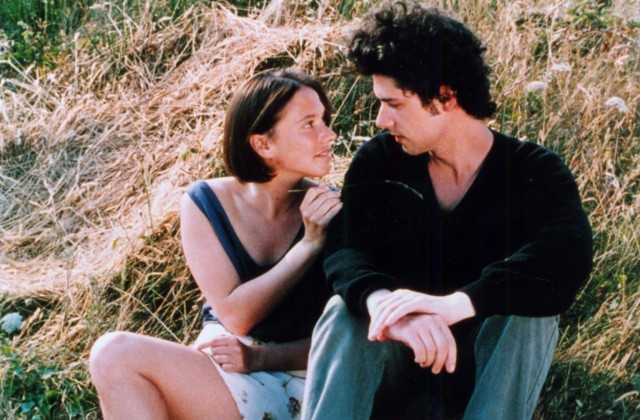
Margot (Amanda Langlet) and Gaspard (Melvil Poupaud) contemplate love and friendship in Éric Rohmer’s A Tale of Summer
A TALE OF SUMMER (CONTE D’ÉTÉ) (Éric Rohmer, 1996)
Friday, July 26, 2:00
Sunday, July 28, 11:30 am
metrograph.com
French New Wave auteur Éric Rohmer’s 1996 A Tale of Summer, the third of his seasonal 1990s stories following A Tale of Winter and A Tale of Springtime and preceding the finale, A Tale of Autumn, is a bittersweet romance about the follies of young love. In a seaside Breton resort town in the 1970s, musician and mathematician Gaspard (Melvil Poupaud) awaits the arrival of his girlfriend, Lena (Aurélia Nolin), who has not been answering his phone calls or returning his letters. He strikes up a perhaps platonic relationship with waitress-ethnologist Margot (Amanda Langlet), whose boyfriend is off in the Peace Corps. When Gaspard makes a move on Margot, she instead encourages him to go out with the free-spirited Solene (Gwenaëlle Simon). Soon Gaspard finds himself lost among three beautiful women, forced to make choices that he’s clearly not ready for.
Strikingly photographed by Rohmer favorite Diane Baratier in a subdued, ’70s-style palette, A Tale of Summer is a charmingly insightful and frustrating exploration of young love, desire, and commitment in which a group of attractive twentysomethings are caught between just wanting to have some fun and plotting out their future. It’s ironic that Gaspard is a mathematician, as he seems to have trouble as soon as he gets to the number three. Meanwhile, it’s appropriate that the ever-wise and knowing Margot (played with a captivating and alluring ease by Pauline at the Beach star Langlet) is an ethnologist, as she carefully studies Gaspard and others as she makes her way through life. Rohmer made A Summer’s Tale when he was seventy-five; the former editor of Cahiers du cinéma would go on to direct four more films before his death in 2010 at the age of eighty-nine. After eighteen years, A Tale of Summer, which premiered at Cannes in 1996, finally got its U.S. theatrical release in 2014 in a new HD restoration, and it is always a lovely way to continue the summer movie season.
